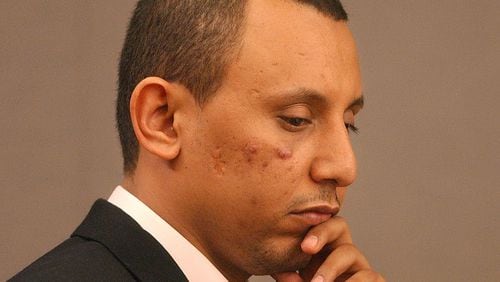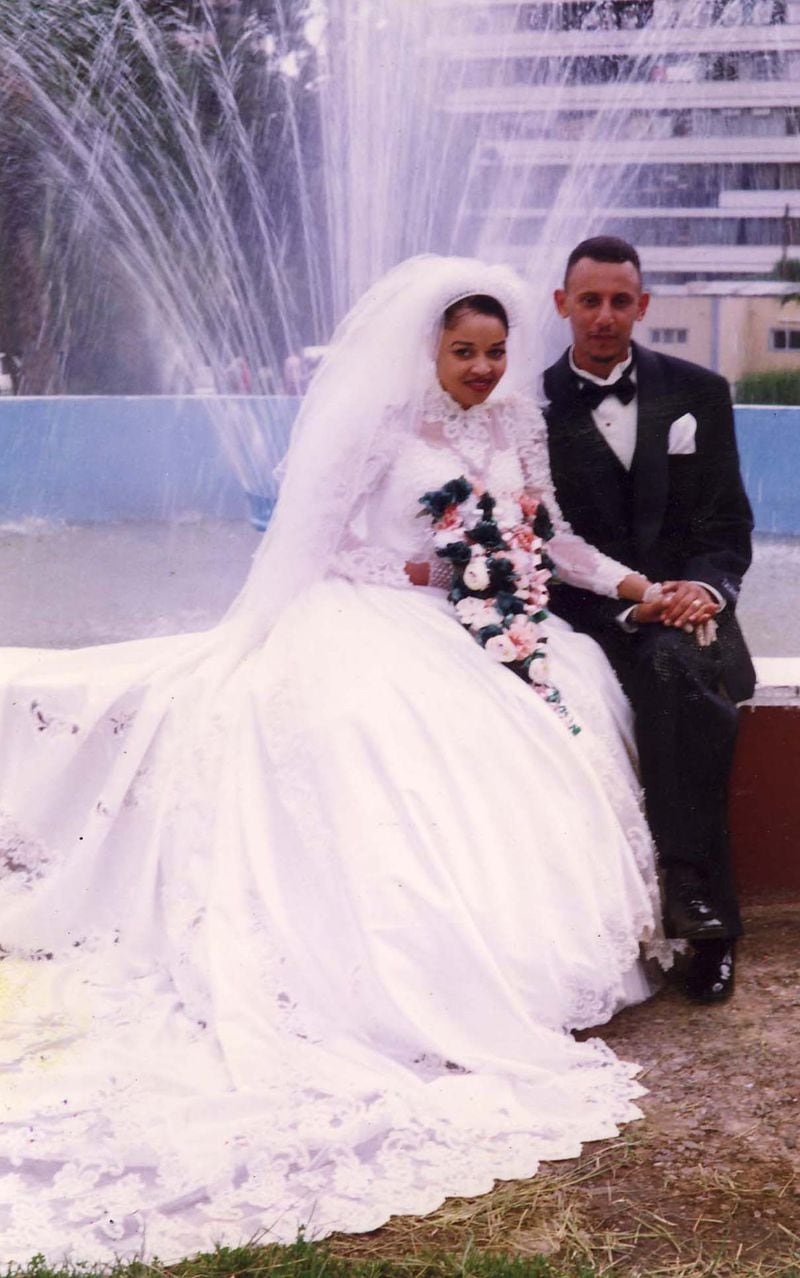NOTE: This article originally published on Oct. 22, 2006 in the Atlanta Journal-Constitution.
A father stands accused of the unthinkable: brutally cutting his daughter's genitals.
The girl was only 2.
Activists from all over the world will be focused on a Gwinnett courtroom Monday as Khalid Adem, accused of circumcising his young daughter, goes to trial.
Adem, 30, was charged with aggravated battery and cruelty to children more than three years ago and, if convicted, could face 40 years in prison. He was born in Ethiopia, where circumcision is a common procedure for young girls.
Adem's trial may be a landmark case for health and human rights activists fighting against the forbidden African custom they call genital mutilation. But for those close to the young victim, this trial is about vindication and healing for a little girl who was forced to endure unbearable pain.
"When I saw that child, I saw myself. I could see the pain in her eyes," said Soraya Mire, a filmmaker and activist who was circumcised when she was 13 in Somalia. Mire is known for her 1994 documentary "Fire Eyes" in which she chronicled her struggles after having the procedure.
Mire, who now lives in Los Angeles, was asked by Gwinnett authorities to counsel the young victim in 2003 when it was discovered that she had been circumcised.
"She hugged me, and I just burst into tears," Mire said. "Since that day, I've been obsessed with finding out who did this to that child."
Police say Adem circumcised his young daughter with scissors in his Duluth apartment while someone else held the girl's legs.
Authorities said the circumcision occurred sometime in 2001 but the mother didn't discover it until two years later. The mother told police she learned about it while arguing with Adem about female circumcision. The mother told police that she told Adem she didn't want that to happen to their daughter, but Adem implied the circumcision had already occurred.
The mother went to a doctor, who confirmed that the girl had been circumcised. The young girl then told Gwinnett authorities that her father had done it. He was arrested in March 2003.
Adem has said through his defense attorney W. Mark Hill that he didn't do it. Hill said the allegations stem from a bitter divorce and custody battle the couple was going through at the time. Hill has said the family of the little girl's mother, Fortunate Adem, also is from Africa and could have performed the circumcision.
Georgia law changed
The African practice of female circumcision has been denounced for decades by health and human rights activists. In some areas in Africa, it's considered a coming-of-age ritual.
Opponents say the procedure, which may involve the removal of the clitoris or all of the external genitalia, is extremely painful, medically unnecessary and unsafe. It is illegal in the United States and has been condemned by the United Nations.
The centuries-old practice is performed for many reasons, including to curtail sex drive and preserve virginity. It also is a prerequisite for marriage in some cultures, experts say.
After Adem was arrested, activists and educators flocked to metro Atlanta to denounce genital mutilation. A four-day conference on the practice sponsored by international women's rights group Equality Now was held in Atlanta three months after the arrest. The conference originally was supposed to be held in Nairobi, Kenya, but was moved to Atlanta because of the national interest after Adem's arrest, said Taina Bien-Aime, Equality Now's executive director.
It is difficult to document the number of female circumcision prosecutions in the United States. Although Congress passed a law in 1996, many states still do not have laws forbidding the practice. But experts who follow the issue say arrests for female circumcision are rare.
"To our knowledge, this was the first documented case of [female circumcision] in the United States," said Bien-Aime, whose organization, with offices in New York, London and Africa, has been following the issue since 1992. "We will be monitoring the trial and hope that it will help bring awareness to the issue."
Adem's arrest also affected Georgia law. In 2003, the state had no law specifically addressing female circumcision. That's why Adem was charged with aggravated battery and cruelty to children.
After her ex-husband's arrest, Fortunate Adem worked with Rep. Mary Margaret Oliver (D-Decatur) to get a law passed outlawing female circumcision. The new law was enacted in May 2005.
If Khalid Adem had been arrested after the new law was in place, he could have faced an additional 20 years for the genital mutilation charge.
Fortunate Adem refused to comment for this article but has said her daughter suffered severe pain since the circumcision.
"Her whole life has been changed, " she said. "She is going to be traumatized psychologically. Parts of her body have been taken away from her without her consent. They need to look at this child the same way they would if she had been raped."
Father claims innocence
Hill will handle the defense case and plans to call about eight to 10 witnesses. He said he is trying to get three of Adem's sisters here from Ethiopia to testify that they had not been circumcised.
Another key piece of evidence will be the taped interview of the young victim in which she told Gwinnett authorities that Adem cut her with scissors. It's unknown whether the prosecution will call the little girl, now 7 years old, to testify.
Gwinnett Assistant District Attorney Marty First will handle the prosecution's case. First declined to comment or give any details about his case.
"I will try this case in the courtroom, not in the media," First said.
Credit: Rich Addicks
Credit: Rich Addicks
Although much has been heard from Fortunate Adem through her efforts in changing Georgia law, this will be the first time that Khalid Adem will publicly tell his side of the story.
He will testify and proclaim his innocence, Hill said.
Adem was bailed out of jail a week after he was arrested and continues to work as a clerk at the same Snellville gas station he did before his arrest, the attorney said.
"His bosses believe in him," Hill said. "He says he did not do it, and I believe him. He wouldn't do this. Every time I think about it, I just say it doesn't make sense."
Hill said there are major problems with the prosecution's case and that Adem was arrested primarily on the word of the then-2-year-old girl, who could have been coached by a mother desperate to get custody. Another problem in the case, Hill said, is that the alleged circumcision, which took place in 2001, wasn't discovered or reported to police until two years later.
"What mother would not know that this has happened to their daughter for two years?" Hill asked. "All my research says that this is extremely painful and takes time to heal. A mother would have noticed this when she gives the baby a bath or changed the diaper."
Hill said the couple's history of problems also has led him to question the charges.
Khalid Adem emigrated to the United States from Ethiopia when he was 16, Hill said. Fortunate Adem moved to this country from South Africa when she was 6, according to court documents. The two met at Georgia Perimeter College in Clarkston. The couple was married, and their daughter was born on Sept. 8, 1999. The couple had a tempestuous marriage.
The young girl lived for years with Fortunate Adem's parents in Gwinnett as the couple was going through the break-up, Hill said. He said Fortunate Adem's mother is a registered nurse who worked at Grady Hospital, and he questions how she wouldn't have noticed that the procedure had been done.
The couple was divorced in August 2003, and Fortunate Adem was awarded full custody of the child. Khalid Adem was not granted visitation rights.
Answers sought from trial
The trial is expected to last about two weeks. Jury selection will begin Monday morning.
Oliver, the state representative who worked with Fortunate Adem to get the new circumcision law passed, said she is convinced that Khalid Adem committed the crime.
"Anybody who does this should be punished to the full extent of the law," said Oliver, a lawyer who also represented Fortunate Adem in her divorce. "And I believe the jury should make the right decision."
Mire, who plans to follow the trial, said this case is about finding the truth for the little girl she once held and cried for.
"My main focus is the girl," Mire said. "I hope that she gets everything that she needs. I am a survivor of this. I know the pain that she is still going to feel. It is brutal and terrible. I wouldn't wish this on my worst enemy."
--------------------------
TIMELINE OF EVENTS
Khalid Adem will stand trial this week for allegedly circumcising his 2-year-old daughter with scissors.
2001: The daughter of Khalid Adem, born in Ethiopia, and his wife, Fortunate Adem, a native of South Africa, is circumcised. The procedure is an ancient ritual practiced by some African cultures.
MARCH 28, 2003: Police arrest Khalid for allegedly circumcising his daughter with scissors. He is charged with cruelty to children and aggravated battery.
APRIL 4, 2003: A Gwinnett County judge cuts Khalid's bond in half, dropping it to $50,000 during a pretrial hearing. He posts bond and is released from jail.
AUGUST 2003: Khalid and Fortunate Adem divorce.
FEB . 27, 2004: A Gwinnett County grand jury indicts Khalid Adem.
MAY 6, 2005: Georgia legislation that makes genital mutilation of females a felony is signed into law. The bill makes the act a crime with a minimum penalty of five years in prison and a maximum punishment of 20 years behind bars. Fortunate Adem is an advocate for the legislation.
OCT. 23, 2006: Jury selection and trial scheduled to begin.
-----------------------------
FACTS ON FEMALE GENITAL MUTILATION
No one knows how many sexually mutilated women and girls live in Atlanta and the United States. It is a hidden, private matter, often called female circumcision, although in some forms it is more akin to castration.
The procedure mainly is performed on children and adolescents between 4 and 14 years of age. In some countries, however, it is performed on infants under 1 year old.
Female genital mutilation is practiced for a number of reasons, including:
- Sexual: to control or reduce female sexuality.
- Sociological: for example, as an initiation of girls into womanhood.
- Hygiene and aesthetics: where it is believed that the female genitalia are dirty and unsightly.
- Health: in the belief that it enhances fertility and child survival.
- Religious reasons: in the belief that female genital mutilation and circumcision is a religious requirement.
- Cultural: In some African cultures, it is practiced as an ancient ritual. Most of the girls and women who have undergone the procedure live in 28 African countries, although some live in Asia.
Source: Staff reports, UNICEF and the Center for Reproductive Rights.








